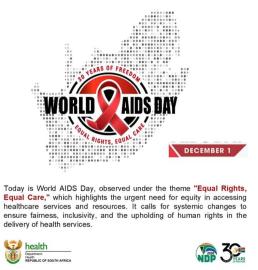World AIDS Day has been an important date on the global health calendar since 1988. Every December 1st, people around the world come together to raise awareness about HIV and AIDS. It’s a day when we remember those we’ve lost, celebrate the progress we’ve made and recommit ourselves to ending this epidemic.
Here in South Africa and across the globe, World AIDS Day is all about education, testing, and support. It’s a chance for us to talk openly about HIV, bust myths, and encourage each other to know our status.
“Equal Rights, Equal Care”: Theme for 2024
This year’s theme, “Equal Rights, Equal Care,” really hits home for us in South Africa. It’s all about making sure everyone, no matter who they are or where they come from, has the same access to HIV prevention, testing, and treatment.
We’ve come a long way in fighting HIV/AIDS, but we still have work to do to make sure everyone gets the care they need. This theme reminds us that health is a human right, and we all deserve equal access to life-saving treatments and support.
Key Message from Dr. Phumza Nobatyi
Dr. Phumza Nobatyi, a respected voice in our fight against HIV, has a simple but powerful message for us: Get tested and know your status. It might seem scary, but it’s the first step in taking control of your health.
“Knowing your status is empowering. It allows you to make informed decisions about your health and your future,” says Dr. Nobatyi.
She reminds us that HIV isn’t what it used to be. With today’s treatments, people with HIV can live long, healthy lives. But it all starts with knowing your status.
Current HIV Treatment Landscape
Remember when an HIV diagnosis felt like a death sentence? Those days are long gone. Thanks to amazing advances in medicine, HIV is now a manageable condition. People with HIV who get proper treatment can live just as long as anyone else.
As Dr. Nobatyi puts it, “It’s not a death sentence, it can be treated.” Modern antiretroviral drugs are more effective and have fewer side effects than ever before. Many people take just one pill a day to keep the virus under control.
Role of Government and Public Health Institutions
Our local health services are working hard to make HIV testing and treatment available to everyone. The Buffalo City Metropolitan Municipality Health District, under Dr. Nobatyi’s leadership, oversees 85 health institutions. These clinics and hospitals are on the front lines, providing testing, counseling, and treatment to our communities.
I’ve seen firsthand how dedicated our healthcare workers are. They’re not just handing out pills – they’re offering support, education, and compassion to everyone who walks through their doors.
Community Voices and Safer Sex Advocacy
Nobantu Ntsaluba, a community health advocate I’ve had the pleasure of meeting, is passionate about promoting safer sex practices and regular HIV testing, especially among young people. Her message is clear: be faithful to your partner and always practice safe sex.
- “We need to talk openly about sex and HIV,” Nobantu told me. “It’s the only way to keep our youth safe and healthy.”
Her words remind me of conversations I’ve had with friends about the importance of honest communication in relationships. It’s not always easy, but it’s crucial for our health and well-being.
Government Leadership and Stakeholders at the Event
This year’s World AIDS Day event in the Eastern Cape was a big one. Deputy President Paul Mashatile was there, along with other government leaders. It was great to see our top officials taking HIV so seriously.
We also had representatives from UNAIDS, the World Health Organization, and PEPFAR (the U.S. President’s Emergency Plan for AIDS Relief). These international partners play a huge role in supporting our fight against HIV/AIDS.
Community Engagement and Participation
I was happy to see my neighbors and fellow community members at the event. It’s always inspiring to see how many people show up to learn, get tested, and show their support.
These grassroots efforts are the heart of our HIV prevention work. It was not just about big speeches – it was about friends encouraging friends to get tested, parents talking to their kids about safe sex, and communities coming together to support those living with HIV.
Conclusion and Call to Action
As we mark another World AIDS Day, let’s remember that knowing your HIV status is one of the most powerful things you can do for your health and your community. Whether your result is positive or negative, knowledge is power.
This year’s theme of “Equal Rights, Equal Care” is a reminder that we’re all in this together. Let’s support each other, fight stigma, and work towards a world where everyone has access to the HIV care and prevention they need.
So, why not plan to get tested? Bring a friend, support a family member, or just do it for yourself. Together, we can make a difference in the fight against HIV/AIDS.

